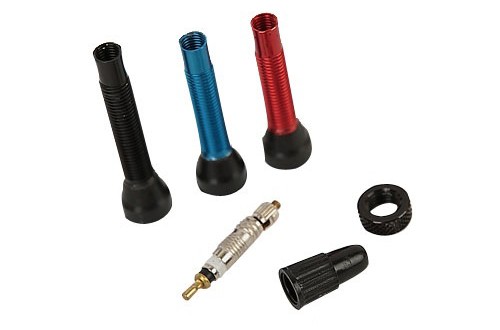Tubeless Valve Construction
While the popularity of tubeless tire systems increases rapidly with mountain bikers, cyclo-cross riders and even road cyclists opting for a tubeless set up, many tubeless valve importers may still not be aware of the intricacies of tubeless valve construction. Several key components make up each Presta tubeless valve, each playing their own unique role to keep tubeless wheels sealed. Throughout this post on tubeless valve construction, we examine these roles and the intricacies of each component’s options.

Separated components from a brass tubeless valve:
stem and base, removable valve core, collar ring and end cap.
Tubeless Valve Stem
The tubeless valve stem is the external casing of the valve. Traditionally made in brass, offering durability and affordability, the market has demanded aluminium construction since 2011. The aluminium tubeless valve stem provides a lightweight option, often with a range of anodized colors available to the consumer. Measured from the base to the tip, the stem can be produced in a number of customizable lengths, generally ranging between 34mm and 68mm. The stem is also manufactured with external threading. This not only securely fastens the valve collar ring, but allows for the connection of a Presta to Schrader valve adapter, which is convenient when a Schrader pump, such as an air compressor, needs to be used for tire inflation such as beading stubborn tires or inflating in a workshop.

Tubeless valve stems come in a range of lengths. The valves pictured above are made from aluminium, allowing them to be anodized in a range of colors.
Removable Valve Core
The removable inner valve core may be the most crucial element in tubeless valve construction. The removable core can be easily removed from the valve whilst it is in place in the rim. This removability allows the user to easily unscrew the core and then fill the tire with tubeless sealant. The valve core is also essential to the tubeless valve as it is host to the screw and nut mechanism that permits air flow through the valve. Situated at the external end of the core, when the nut is screwed closed it seals the valve. When loosened, air can flow freely through the valve in either direction.
Valve Collar Ring
Also referred to as the lock ring, the valve collar ring is a solid metal ring that secures the valve to the wheel rim. When the valve collar ring is fastened correctly it prevents air from escaping the inside of the tire, thus eliminating any frustrating slow air leaks that could occur.
End Cap
The plastic end cap is easily fastened to or removed from the end of the valve by simply twisting. The cap provides protection for the tip of the removable valve core, which protrudes the end of the tubeless valve stem to allow the user to open and close the valve, and keeps dirt out of this mechanism.
Valve Stem Base
At the opposing end of the valve to the cap, a rubber base is attached to valve stem. The rubber base is the contact point of the valve to the internal side of the rim. For this reason the rubber base is offered in both round and square finishes, providing suitable options to ensure the base is compatible with the rim it is being fitted to. Compatibility is essential to maintain an airtight seal around the valve and prevent any leaks.
Though less common, American Classic style tubeless valve stems use an o-ring with a metal base, rather than an entirely rubber base.
Want to know more about tubeless valve construction? Contact us today and we will happily walk you through the different configurations of tubeless valve construction.






Tire valve caps are the final seal again potential faruile in the valve of the valve stem. A good tire valve cap will come with high quality rubber seal that push against the circumferential ‘ring’ of the valve stem and thereby help to contain the air should the valve fail or not containing the air very well. You observation of your tire (the one with the missing cap) losing air confirms that this could be a possibility.Of course, the other possibility is that your tire is having a slow leak go to any petrol station, and it could be rectified at a minimal cost.Note: Even if the valve is perfectly good, if the tire go over a bump or pot hole, it is still susceptible to lost of air due to the additional pressure asserted during the hit.